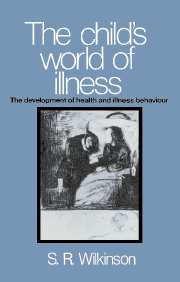Book contents
- Frontmatter
- Contents
- Acknowledgements
- Glossary
- 1 Presenting a problem
- 2 The form of dialogue
- 3 What has gone before: some background information
- 4 The primary structure to the child's world of illness
- 5 Germs and bugs: causal agents
- 6 Dirt and fresh air: the exogenous system
- 7 My castle and the good germs: the endogenous system and its boundary
- 8 ‘Pretend illness’: An analysis of how communication patterns can foster particular forms of complaints
- 9 The consultation: a form of dialogue
- 10 Health education and health promotion
- Appendixes
- References
- Index
1 - Presenting a problem
Published online by Cambridge University Press: 23 September 2009
- Frontmatter
- Contents
- Acknowledgements
- Glossary
- 1 Presenting a problem
- 2 The form of dialogue
- 3 What has gone before: some background information
- 4 The primary structure to the child's world of illness
- 5 Germs and bugs: causal agents
- 6 Dirt and fresh air: the exogenous system
- 7 My castle and the good germs: the endogenous system and its boundary
- 8 ‘Pretend illness’: An analysis of how communication patterns can foster particular forms of complaints
- 9 The consultation: a form of dialogue
- 10 Health education and health promotion
- Appendixes
- References
- Index
Summary
From time to time we all have difficulties knowing how to be certain that another person knows what we mean. At times this is unimportant, but when we want a response from that person we need to know that they have understood. When it comes to complaining about our own discomforts, the uncertainty of knowing whether our message has been adequately received is pressing. It becomes an acute problem when we rest in hope that those to whom we have presented our discomforts will take what we feel is appropriate action to help us feel better.
Sometimes we have opportunities to appraise beforehand relative strangers who might help us. Children like to be familiar with teachers who might have to help them in a crisis. They have their own ways of finding out whether they could rely on them in an emergency. People can visit their future general practitioner before they register with a practice, although this is seldom encouraged. It is sometimes very difficult to find answers on such a preliminary visit, as we remain uncertain which questions to ask and uncertain to what degree we can rely on the answers we receive.
Whether the potential care-giver is a parent, doctor or teacher, the aim of a child often appears to be to find out what makes a difference to that person.
- Type
- Chapter
- Information
- The Child's World of IllnessThe Development of Health and Illness Behaviour, pp. 1 - 9Publisher: Cambridge University PressPrint publication year: 1988

